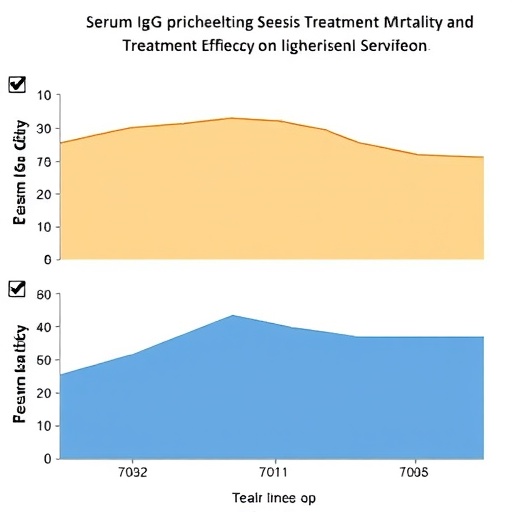In a groundbreaking study set to reshape the landscape of sepsis treatment, a research team led by Hu, YY, and colleagues has unveiled compelling evidence that serum immunoglobulin G (IgG) levels are not only predictive of mortality in sepsis patients but also crucial in determining the efficacy of intravenous immunoglobulin (IVIG) therapy. This study, published in Military Medical Research, emphasizes the urgent need for precision medicine in the management of sepsis, an acute condition that remains a leading cause of mortality in critical care settings worldwide.
Sepsis is defined as a life-threatening organ dysfunction caused by a dysregulated host response to infection. Approximately 11 million people succumb to sepsis annually, making it a global health crisis that necessitates innovative therapeutic strategies. One such strategy may lie in the administration of immunoglobulins, which are essential components of the immune system. Previous studies had suggested the potential benefits of IVIG in sepsis, yet the lack of personalized approaches has limited its application. Understanding how individual serum IgG levels correlate with patient outcomes could revolutionize treatment protocols.
The findings from Hu and colleagues suggest that measuring serum IgG concentrations can provide vital insights into the severity of a patient’s condition. Elevated levels of IgG were associated with poor outcomes, suggesting that patients with higher serum IgG may experience a heightened inflammatory response, contributing to multi-organ failure—a common outcome in severe sepsis cases. This association underscores the necessity for continuous monitoring of immunoglobulin levels in sepsis patients, as it may facilitate more informed clinical decisions and better outcome predictions.
Additionally, the study explores the role of IVIG therapy and its potential benefits for patients with varying serum IgG levels. With the insight that not all patients will benefit equally from IVIG administration, the researchers propose a stratified approach, wherein those with certain IgG thresholds may be prioritized for this treatment. This differentiation could optimize resource allocation in healthcare settings, ensuring that patients who stand to gain the most from IVIG are identified and treated promptly.
The research also illuminates the biological mechanisms underlying sepsis-related immune dysfunction. It is well-established that sepsis induces alterations in immune cell function and cytokine production. By linking serum IgG levels to these immunological changes, Hu et al. provide a clearer picture of how immunoglobulins and inflammatory responses interact during sepsis. This deeper understanding of the pathophysiology underlying sepsis could pave the way for novel therapeutic interventions targeting the immune response effectively.
Moreover, the implications of these findings extend to the design of clinical trials for new therapies. Traditionally, clinical trials have enrolled patients without considering individual immune profiles, leading to varied results and challenges in interpreting efficacy. By incorporating serum IgG measurements into trial design, researchers could establish more homogeneous study populations, thereby enhancing the likelihood of detecting significant treatment effects and facilitating the approval of promising new therapies.
As the medical community grapples with the complexities of sepsis treatment, this study serves as a clarion call for a more nuanced approach to patient care. The identification of serum IgG as a potential biomarker not only revolutionizes how clinicians assess risk but also highlights the importance of personalized medicine in acute care settings. As researchers globally explore adjunctive therapies and innovative medications, the integration of immunological assessments into routine clinical practice may very well become the new standard in sepsis management.
The urgent need for advancements in sepsis therapy cannot be overstated. With the continuing rise of antibiotic-resistant infections and the challenges posed by global health emergencies, such as the COVID-19 pandemic, new strategies to enhance patient outcomes are critical. The work of Hu and colleagues heralds a pivotal moment in the intersection of immunology and critical care medicine, demonstrating the urgent call for further research to validate these findings and translate them into clinical practice.
In conclusion, the innovative work presented by Hu, YY., Pang, MM., Wang, HY., and their team offers a transformative perspective on the management of sepsis. By linking serum IgG levels to mortality and therapeutic responses, they underscore the importance of precision medicine in treating this life-threatening condition. As the medical community moves forward, the integration of immunoglobulin assessments into standardized sepsis protocols could mark a momentous shift towards improved patient outcomes in critically ill patients.
Achieving breakthroughs in sepsis treatment is paramount, and the findings from this study represent a significant step forward. As researchers continue to explore the depths of immunological responses in sepsis, the hope is to uncover additional biomarkers and therapeutic targets that can further enhance our understanding and management of this complex condition. The race against time to improve sepsis care has never been more urgent, and the insights from Hu and colleagues provide a beacon of hope in the fight against one of modern medicine’s most lethal challenges.
With these revelations in hand, it becomes clear that a comprehensive understanding of immunological parameters within sepsis patients is essential. As we await further studies that build on these findings, one can only speculate on the future of IVIG therapies and their role in personalized medicine. The evolution of sepsis treatment may very well hinge on the ability of clinicians to understand and apply these groundbreaking insights for the benefit of their patients.
Subject of Research: The predictive value of serum immunoglobulin G in sepsis patients and its role in intravenous immunoglobulin therapy.
Article Title: Serum immunoglobulin G predicts mortality and stratifies intravenous immunoglobulin benefit in sepsis patients.
Article References: Hu, YY., Pang, MM., Wang, HY. et al. Serum immunoglobulin G predicts mortality and stratifies intravenous immunoglobulin benefit in sepsis patients. Military Med Res 12, 70 (2025). https://doi.org/10.1186/s40779-025-00657-5
Image Credits: AI Generated
DOI: 10.1186/s40779-025-00657-5
Keywords: sepsis, serum immunoglobulin G, mortality prediction, intravenous immunoglobulin therapy, precision medicine, immunology, clinical trials, immune dysfunction.




